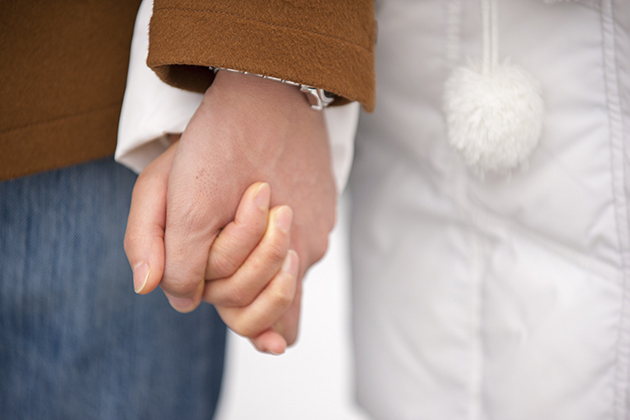
With Valentine’s Day right around the corner, UConn Today asked Kari Adamsons, associate professor in UConn’s Department of Human Development and Family Studies who teaches a course on Close Relationships Across the Lifespan, for her insights on marriage and relationships in this country today.
It’s almost Valentine’s Day, a day of that celebrates romance and togetherness, but isn’t everyone getting divorced?
Actually, no! Divorce rates peaked in the 1970s and 1980s, but they have declined slowly but steadily since then. In fact, recent research shows that 70 percent of marriages that began in the 1990s made it to their 15th anniversary, and those married in the 2000s have even lower rates of divorce so far. And – great news for UConn students – divorce rates have decreased the most among people with college degrees.
Are there particular things that predict the success of marriages and relationships?
Absolutely. It’s very important to find a partner who is a good “fit” for you, which usually means someone who is pretty similar to you in terms of their values, beliefs, and goals. Despite the cliché, opposites really don’t attract, or even if they do, it’s hard for them to stay together very long. Having different hobbies or interests is ok, but if you can’t agree on whether or not to have kids, how to spend money, how much time to spend with each other, or even whether your life goals are compatible, it will be tough to have a long-term relationship with someone.
Beyond picking a good partner, it’s critical to know how to communicate effectively with each other. Disagreements will happen, and so will misunderstandings. If you can’t argue fairly and constructively (yes, it’s possible!) or don’t feel comfortable sharing your thoughts and feelings with each other, the relationship likely won’t last. And take your time and be willing to put in a lot of work. Figuring out if you are really compatible with someone and learning how to communicate with each other and working through differences takes time, so don’t rush things! Good relationships take time and effort to build; they don’t just magically happen (sorry Disney), so you have to be willing to spend both to make a relationship work.
And this goes for all kinds of relationships, be they friendships, family, or romantic partners. More often than not, a good relationship is a good relationship, and it takes the same things to make them work.
How about the other side of the coin? What are some danger signs?
A lack of respect, trust, or communication are all major warning flags, because those are the core components of healthy relationships. Too much conflict (especially if it isn’t handled well) also is a warning sign. Some people think ANY conflict is bad, which isn’t true because all relationships will have conflict in them. But you shouldn’t be fighting all the time, or even half the time. Research shows that happy couples usually have at least 5 happy interactions for every negative interaction, but that unhappy couples are often closer to 1:1 (or even less, having more negatives than positives).
Unhappy couples also tend to use more hostile sarcasm and insults towards each other, attack each other’s character, won’t take responsibility for problems, and shut down or withdraw rather than engaging in discussions. All of those tend to eat away at relationships, rather than helping them last.
A final one that sometimes surprises people – do all of your friends and family not like this person and think they aren’t good for you? Odds are, they’re right. In some ways, love really does make us blind, so our close friends and family are often better judges of our relationships than we are. They’re less biased, but they know us well and have our best interests at heart. One or two people might just be a personality conflict, but if most of the people you feel close to and understood by don’t like the person … your friends and family probably are seeing something you aren’t, not the other way around.
Bearing in mind that many people are happily single, do you have any thoughts about how to get through all the hoopla surrounding Valentine’s Day if you happen to be unattached, either by choice or by circumstance?
“Love” includes a lot more things than just romantic relationships. All of us have close relationships, whether they are family, friends, or romances, and it’s also vital that you have a healthy relationship with yourself! So first, take Valentine’s Day to tell friends, family, and anyone important to you that they matter to you and that you love them! Everyone likes to know they are appreciated and valued, and Valentine’s Day is a great day for that.
And second, in the busy-ness of daily life, we often forget to take time for ourselves. So take yourself out on a date and do whatever YOU want for the day. Catch up on those hobbies you always wish you had more time for, go see a movie you’ve been dying to see, or write an email or make a phone call to friends you haven’t talked to enough lately. When it’s an intentional choice to do something on your own, not just what you feel like you got stuck with because “everyone else” is busy, you’ll be surprised how enjoyable it can be.
In some relationships one partner never seems to remember any significant dates such as birthdays or anniversaries, but Valentine’s Day is hard to miss. Any thoughts about a ‘significant other’ who just doesn’t seem to want to celebrate the day but their partner clearly does?
Like anything else in relationships, whether or how to recognize occasions and holidays is something that has to be negotiated. Some people start out on the same page, and some don’t. As always, the first and biggest step is communication. A person can’t fix a problem they don’t know exists! Have a conversation when you’re both feeling calm (NOT when you’ve been stewing about it) about how you each view holidays or occasions, and why you do or don’t like to celebrate them.
Focus on talking about how you each feel or what you wish would happen, NOT attacking the other person for what they do or don’t do. Hearing “I really like celebrating things like Valentine’s Day because it makes me feel special and valued” is very different from hearing “You never do anything for me for Valentine’s Day! You’re so inconsiderate!”
If, after talking about it, you find you truly do have opposite expectations and wants, then you’ll have to make a decision. You can either decide you’re ok with leaving things as they are (but you truly have to be ok with that, not just secretly hope it changes), decide it’s a deal-breaker and leave the relationship, or find some way to compromise. Perhaps you celebrate some occasions, but not others. Maybe the person thinks it’s too expensive and is embarrassed that they can’t afford expensive gifts or dinners, so you could celebrate in less expensive but still meaningful ways, like making a nice dinner at home and watching a movie together on DVD. But the only way to find a solution, is to communicate about the problem!



